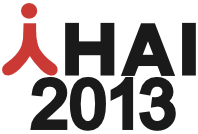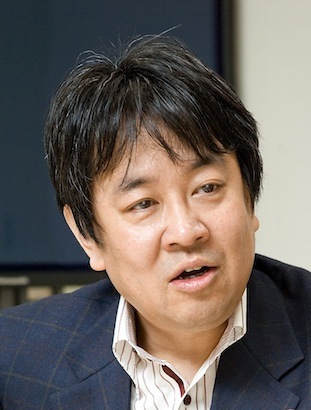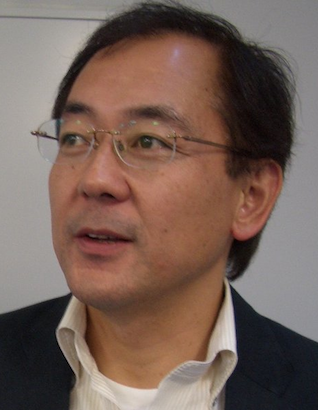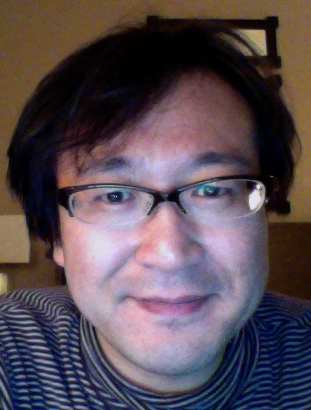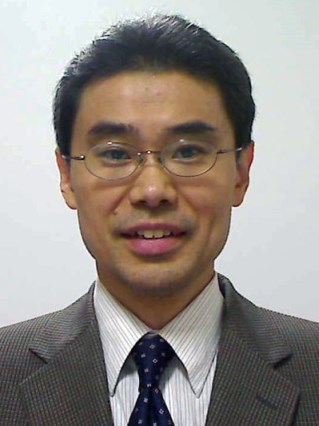iHAI 2013 General Co-chairsf Welcome@ | |
|---|---|
|
HAI (Human-Agent Interaction) has been developed for these ten years by the most active researchers and developers in various fields including AI, robotics, human-computer interaction, and cognitive science. Most of the pioneering researchers were not satisfied with conventional research topics in AI, human-computer interaction, human-robot interaction. Because the studies in the research fields were restricted in developing autonomous agents (non-interactive with a human), physical robots, and just implementations of user interface in specific domains and there were researchers who were frustrated with such restrictions and needed novel approaches across the related research fields. Also, in recent years, virtual, anthropomorphic and pet-like agents have spread in offices and home, and interactions between end-users and various kinds of agents occurs there. Although interaction design for robots and virtual agents has been investigated in different research fields, few studies were done on the subject for various agents in a unified aspect. HAI is trying to deal with three different kinds of interaction, namely human-robot agent interaction, human-virtual agent interaction, and human-human interaction with virtual and robotic agents, and to provide a unified design framework for the three kinds of interaction and clarify the fundamental differences among the interactions. Novel and significant research issues have been pointed out thus far in HAI and solutions to them also have been proposed. The issues are related to the design of agentfs appearance and function, investigation and modeling of human behaviors against agents, design of expressions from agents, and design of physical properties of agents. Although many studies on the solutions to the issues have been achieved, gWhat is the future direction of HAI?h is still one of the main topics in HAI. Because, although HAI has significant academic contributions to related research areas, the fundamental framework and the killer applications remain unclear. We hope these issues will be discussed at iHAI 2013 and the solutions will be proposed. Most members of the iHAI 2013 program committee have mainly contributed to the development of HAI by holding HAI symposiums since 2006 every year in Japan and organizing workshops and special sessions in various related international conferences like RO-MAN, IROS. Also the international workshop on HAI (iHAI 2012) was held last year with IROS 2012. Through such constructive preparations, we are very pleased to hold iHAI 2013 conference this year and indeed appreciate all the contributors including program, local organization, finance, poster, publication, sponsorship, publicity, web & design co-chairs, the program committee members, secretaries and the reviewers. iHAI 2013 General Co-chairs
|
iHAI 2013 PC co-chairsf Welcome@ | |
|---|---|
|
We are happy to have a great program for the first international conference on Human-Agent Interaction (iHAI 2013). Full Papers submitted to the conference were thoroughly reviewed by PC members. The program committee selected 10 papers out of 31 (32%) submissions as honorable mention papers. The program of iHAI 2013 conference includes all submitted papers. The selected honorable mention paper has a special mark on the program to indicate that the paper contains suggestive remarks for Human-Agent Interaction study. The review system of accepting all papers and marking relevant papers is a new conference style. The program based on the new conference style is aimed at preparing opportunities to discuss important issues and thorough research works without missing all topics in which a lot of researchers in HAI field currently have interests. The field of Human-Agent Interaction includes a wide range of issues related to human and agents. The conference style is appropriate for covering the wide area and encouraging a new value of a research. Interactive Session accepted 26 papers which will be presented as posters at the conference. We have invited three keynote speakers : Dr. Seiji Yamada, Mr. Hiroyuki Itoh, and Dr. Minho Lee. They will discuss topics relevant to Human-Agent Interaction, technologies for interactive agents, and human cognition. We are especially thankful for the hard work by authors who submitted papers and poster papers. The conference could not have occurred without the extensive volunteer effort put forth by the organizing committee and program committee. We hope you will be inspired by the researches included in iHAI 2013 program. iHAI 2013 Program Co-Chairs
|
